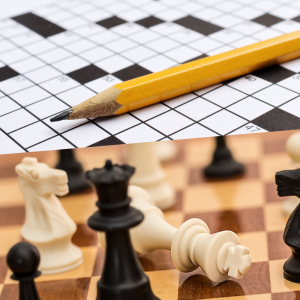Unlock the secret to avoiding dementia – Crosswords and chess might be more beneficial than you think!
By
VanessaC
- Replies 6
We all love to do something in our free time that brings us some joy and makes us feel more like ourselves. Whether it's reading, knitting, painting or even just catching up with friends for a chat, most of us have a favourite pastime that helps us relax and unwind.
But as it turns out, some of these hobbies might also come with an unexpected health bonus – dementia prevention!
A recently published study conducted by Monash University in Australia sought to examine the impact of certain leisure activities on an individual’s chance of developing dementia later in life.
Using data collected from over 10,000 Australian seniors aged 70 and over, researchers observed that engaging in activities like computer use, crosswords, and chess were more strongly associated with older people avoiding dementia than hobbies such as knitting, painting, and socialising.
The results of the study were some of the most robust to date on the topic of dementia risk, and they remained statistically significant even when adjusted for earlier education levels and socioeconomic status. Something that we found particularly interesting is that no significant variations were found between men and women – this means that both genders get the same benefit from engaging in these activities!
After looking through the full list of activities that were assessed – from adult literacy activities such as attending classes, using computers, and keeping a journal to creative hobbies like woodwork, knitting, and painting, and more passive activities like keeping up with the news and listening to music – the researchers concluded that activities that involve active manipulation of previously stored knowledge may play a greater role in dementia risk reduction than more passive recreational activities.
In other words, those who engage regularly in mentally stimulating activities are more likely to keep their minds sharp and active, which in turn reduces their risk of developing dementia. Senior author Associate Professor Joanne Ryan, from the School of Public Health and Preventive Medicine at Monash University, noted: 'I think what our results tell us is that keeping the mind active and challenged may be particularly important' to fighting off dementia.
It's worth mentioning that the results of the study were not meant to imply that hobbies such as knitting and painting don't offer any cognitive benefits – simply that other activities may provide greater advantages.
Where does that leave you, our dear members, then? Well, if cognitive health is a priority for you, it may be worth joining or taking classes in literacy, doing crosswords, playing chess, or any other game that challenges your mind in the long-term.
We all know the power of keeping your brain sharp and mental acuity as you get older – and thanks to this study, we now know the types of activities that are associated with a better chance of avoiding dementia.
Benefits of Mental Stimulation and Cognitive Activities on Brain Health
Studies repeatedly show that the human brain can indeed continue to develop and adapt, even in our later years. This plasticity of the brain is a key factor in maintaining our cognitive abilities as we age.
The ageing brain is like a muscle: if you don't use it, you lose it, and mental stimulation is the exercise our brains need to stay fit and healthy.
Engaging in tasks such as crosswords, chess, journaling, and different classes, demand the active use of brain cells, encouraging them to function optimally. This stimulation keeps our brains flexible, which can improve various mental capacities such as problem-solving, memory retention, and attention span.
Part of the benefit just might lie in the challenge – our minds need to stretch to adapt to new situations or learn new skills. This could be why more passive recreational activities like knitting and painting aren't quite as effective in helping us ward off dementia – they simply might not be challenging enough to engage the mind on a deeper level.
Interestingly, a parallel study by the American Journal of Geriatric Psychiatry found that people who engage in cognitively stimulating activities are less likely to develop mild cognitive impairment, a precursor to dementia.
Again, this is not to say that hobbies like painting or knitting don't have their own benefits – they certainly do. They help reduce stress, improve self-confidence, and are fantastic for overall well-being. But when it comes to protecting the brain from degenerative conditions like dementia, it might be worth putting on your thinking cap and picking up a crossword or a chessboard.
To put it in a nutshell, exercising the brain is beneficial whether you're young or old. It's never too late to pick up brain-boosting activities – so why not incorporate them into your daily routine? As the saying goes, 'a mind is a terrible thing to waste.'
So why not consider doing something different this weekend? We also have some activities you can try to keep your minds active and challenged! Sharing is caring – let us know how you keep your minds active in the comment section below!
But as it turns out, some of these hobbies might also come with an unexpected health bonus – dementia prevention!
A recently published study conducted by Monash University in Australia sought to examine the impact of certain leisure activities on an individual’s chance of developing dementia later in life.
Using data collected from over 10,000 Australian seniors aged 70 and over, researchers observed that engaging in activities like computer use, crosswords, and chess were more strongly associated with older people avoiding dementia than hobbies such as knitting, painting, and socialising.
The results of the study were some of the most robust to date on the topic of dementia risk, and they remained statistically significant even when adjusted for earlier education levels and socioeconomic status. Something that we found particularly interesting is that no significant variations were found between men and women – this means that both genders get the same benefit from engaging in these activities!
After looking through the full list of activities that were assessed – from adult literacy activities such as attending classes, using computers, and keeping a journal to creative hobbies like woodwork, knitting, and painting, and more passive activities like keeping up with the news and listening to music – the researchers concluded that activities that involve active manipulation of previously stored knowledge may play a greater role in dementia risk reduction than more passive recreational activities.
In other words, those who engage regularly in mentally stimulating activities are more likely to keep their minds sharp and active, which in turn reduces their risk of developing dementia. Senior author Associate Professor Joanne Ryan, from the School of Public Health and Preventive Medicine at Monash University, noted: 'I think what our results tell us is that keeping the mind active and challenged may be particularly important' to fighting off dementia.
It's worth mentioning that the results of the study were not meant to imply that hobbies such as knitting and painting don't offer any cognitive benefits – simply that other activities may provide greater advantages.
Where does that leave you, our dear members, then? Well, if cognitive health is a priority for you, it may be worth joining or taking classes in literacy, doing crosswords, playing chess, or any other game that challenges your mind in the long-term.
We all know the power of keeping your brain sharp and mental acuity as you get older – and thanks to this study, we now know the types of activities that are associated with a better chance of avoiding dementia.
Benefits of Mental Stimulation and Cognitive Activities on Brain Health
Studies repeatedly show that the human brain can indeed continue to develop and adapt, even in our later years. This plasticity of the brain is a key factor in maintaining our cognitive abilities as we age.
The ageing brain is like a muscle: if you don't use it, you lose it, and mental stimulation is the exercise our brains need to stay fit and healthy.
Engaging in tasks such as crosswords, chess, journaling, and different classes, demand the active use of brain cells, encouraging them to function optimally. This stimulation keeps our brains flexible, which can improve various mental capacities such as problem-solving, memory retention, and attention span.
Part of the benefit just might lie in the challenge – our minds need to stretch to adapt to new situations or learn new skills. This could be why more passive recreational activities like knitting and painting aren't quite as effective in helping us ward off dementia – they simply might not be challenging enough to engage the mind on a deeper level.
Interestingly, a parallel study by the American Journal of Geriatric Psychiatry found that people who engage in cognitively stimulating activities are less likely to develop mild cognitive impairment, a precursor to dementia.
Again, this is not to say that hobbies like painting or knitting don't have their own benefits – they certainly do. They help reduce stress, improve self-confidence, and are fantastic for overall well-being. But when it comes to protecting the brain from degenerative conditions like dementia, it might be worth putting on your thinking cap and picking up a crossword or a chessboard.
To put it in a nutshell, exercising the brain is beneficial whether you're young or old. It's never too late to pick up brain-boosting activities – so why not incorporate them into your daily routine? As the saying goes, 'a mind is a terrible thing to waste.'
So why not consider doing something different this weekend? We also have some activities you can try to keep your minds active and challenged! Sharing is caring – let us know how you keep your minds active in the comment section below!









